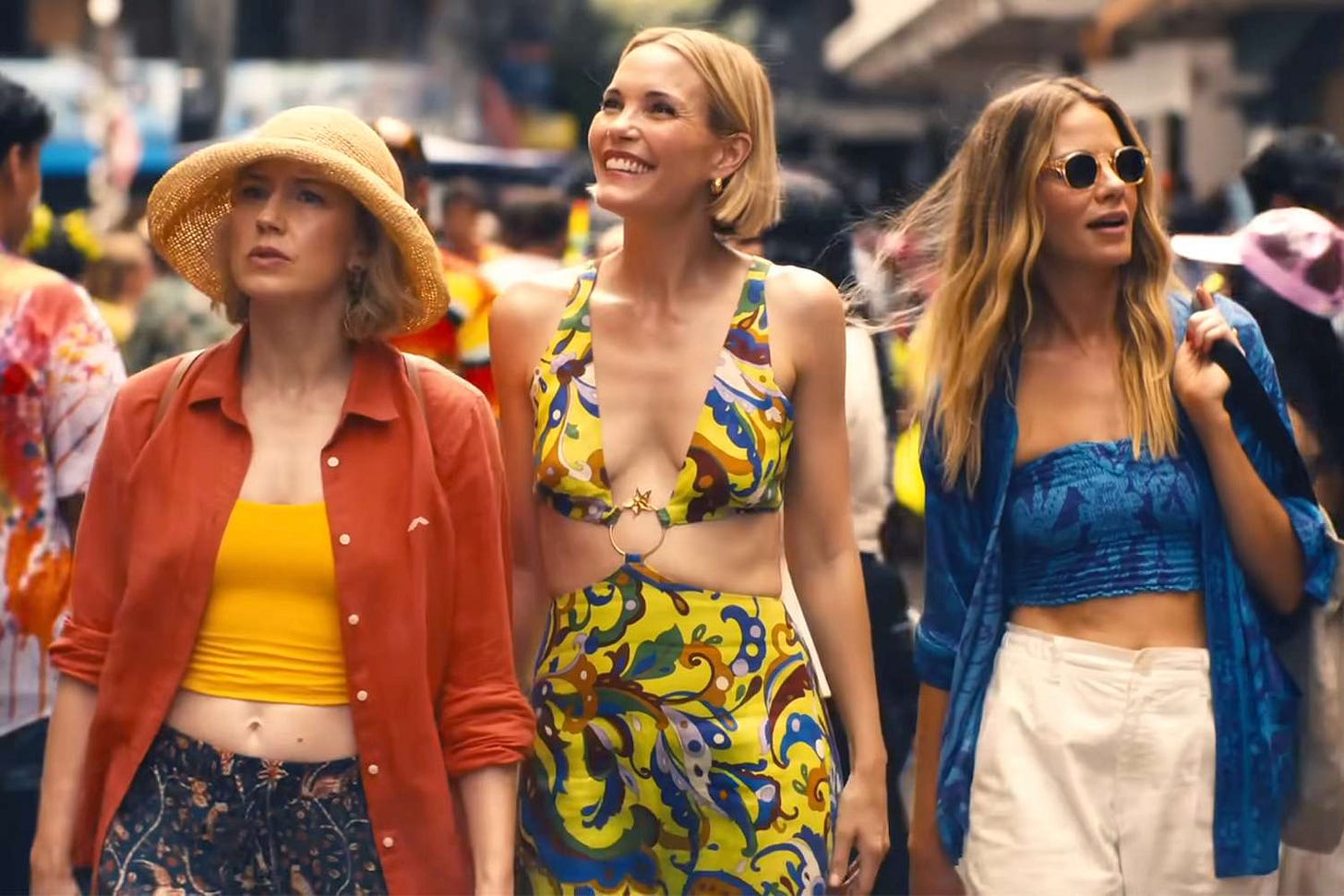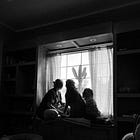Optimist vs the frenemy: what The White Lotus taught me about female friendship
Fake acceptance, oozing judgement, and the deadly sting of the frenemy.
There’s a scene in the new season of The White Lotus that I could only watch through my fingers. Though the show can be violent, it was an entirely different horror making my heart rate climb: toxic female friendship.
Jaclyn (Michelle Monaghan), Laurie (Carrie Coon) and Kate (Leslie Bibb) have been friends forever. Now in their late forties, they’re reuniting for a girls’ trip at a swanky Thai hotel.
There’s just one problem: they don’t seem to like each other.
In alcohol-fuelled, late-night gossip sessions, the three friends alternate in their allegiances, seizing on any perceived weakness the moment a tanned back is turned. She had a brutal divorce. She’s had too much plastic surgery. She’s got a miserable social life.
As their unkindness curdled into outright cruelty, I felt nauseous. These women were my worst nightmare—female frenemies—relationships swarming with fake acceptance, oozing judgment, and enough knives in the back to outfit a steakhouse. I couldn’t help but think about my own relationships with women and how much they’ve changed over the course of my life.
Like many women in their thirties, I’ve recently found myself reckoning with what female friendship should look like.
In the past six years alone, I’ve reunited with my childhood best friend after an argument in our twenties tore us apart, and our mutual breast cancer diagnosis brought us back together. I’ve grappled with unimaginable guilt when my friend died and I survived.
I’ve tried (and often failed) to make new connections in a city that can feel allergic to anything deeper than surface-level niceties. I’ve started a support group for young cancer survivors, forged friendships with other creatives, and last year, made the painful decision to walk away from a friendship that once felt like family.
Tumultuous doesn’t even begin to cover it. And as I’ve navigated cancer treatment, survivor’s guilt and good-old-fashioned ageing, I’ve been seriously questioning what exactly I want from my friendships.
What does friendship actually look like in your thirties? How much messiness is normal? And when is it okay to say: “this isn’t working anymore”?
I grew up in a small town in the English countryside, where everyone knew each other, carried judgements ranging from disapproving to scathing, and rarely held back in sharing their opinions—though not always to your face.
My group of girlfriends throughout my school years was close—if not catty—and remained so until my early twenties. A drunken argument—followed not long after by my move to Los Angeles—effectively severed me from the clan. I still wanted to be included, but I was too proud to say so. A torrent of hurt feelings, girl politics, and shifting dynamics made me feel like I’d been voted out. At the time, it was the most painful ‘breakup’ I’d ever experienced. And it made me wary of being friends with women.
Painful memories flashed through my mind as I watched The White Lotus. If I were still part of my old friendship group, would we all behave like this?
Sometimes, on the rare occasion I’m on Facebook or Instagram, I see a post from an old friend, and a pang of jealousy hits. A primitive part of me that can’t bear being left out. But I wonder, if it weren’t for social media, would I even remember these women’s names? Would I care at all about what they were doing? Who does it really serve to keep up relationships with people we no longer have anything in common with, and maybe don’t even like? In these moments, I contemplate how social media is extending the lives of friendships that, in previous decades, would have been destined to fizzle out.
Of one thing I’m certain: I don’t want the frenemy dynamic to be the future of my female friendships. I don’t want to be fifty years old, worrying about what my supposed closest friend is saying behind my back.
I believe that friendship should be about acceptance, about not only knowing—but believing—that we’re each of us doing the best we bloody can.
Since my friendship breakup last year, I’ve been slowly, cautiously opening myself back up to new connections, and I’m happy to report I’ve made some wonderful new friends: other writers, cancer survivors, and even a doctor. I love the company of women, and I don’t want fear—or pride—to keep me from the joy, wisdom, and warmth they so often bring.
That said, the most important quality I now look for in a friend is that they take me as I am. I want to hear about their hopes and dreams, and not where they think I’m going wrong with mine. I want to cheer them on through whatever they’re working on in therapy, without feeling judged for how long it’s taking me to find my own healing. And I want to feel safe being messy or imperfect, without it being treated like a flaw to be fixed.
I still believe in the beauty of female friendship—but I dream of the day it evolves past teenage cattiness.
I want less competition and more compassion.
Less pride, and more patience.
Less backstabbing and more grace for our lopsided life trajectories.
Honestly? At this point in our lives… don’t we deserve so much better?

Thanks so much for reading! Please hit the ❤️ button if you made it all the way to the end; it really buoys my sensitive soul.
What do you want out of your friendships? And why? Please tell me in the comments!









The commentary about Laurie on The White Lotus has been especially interesting to witness; most of it I have seen as supporting Laurie as the "good, real friend," even though Laurie instigated the gossip in many of the scenarios and also partook in slamming her friends behind their backs. I wish there was more of "what can we take from this TRIO" as you've so eloquently written about in your own post. I'm glad we're Substack friends 🫶🏼
You watched The White Lotus, whereas I gave up on it in the second episode! I witnessed the nasty side of female friendships earlier in my life. Finally, in the past 20 years (now in my late 60s), I have found a group of women to rely on and love, who do the same for me. They stood by me in the worst time of my life, losing my spouse, and have remained loving and loyal ever since. We need each other more than ever now with aging, health concerns, family issues, etc. The laughter and love we spread will help us more than ever. Enjoyed your story!